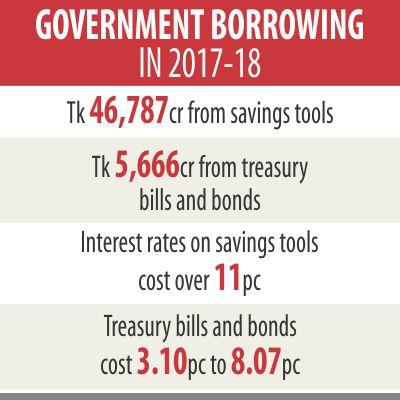Curious logic of govt's costly borrowing

The cost of borrowing, be it for the government or businesses, is imperative: the lower the costs, the better.
But for the Bangladesh government this fact seems to be immaterial: it has been resorting to costlier options for the last several years even though the cheaper ones are knocking at its front door.
The government borrowed from high-cost national savings tools instead of going for the low-cost bank borrowing in the recently concluded fiscal year, and in doing so, have created a large financial burden for the near future.
In fiscal 2017-18, the government borrowed only Tk 5,666 crore from the banking sector by using Treasury bills and bonds against the annual target of Tk 28,203 crore.
On the other hand, the net sales of savings certificates stood at Tk 46,758 crore against the annual upward revised target of Tk 44,000 crore.
The government is yet to face any obstacle in managing its deficit financing but it would have gotten more fiscal space for the development projects if the interest payment against its domestic borrowing was lower, said Ahsan H Mansur, executive director of the Policy Research Institute of Bangladesh.
More than Tk 51,000 crore was allocated for interest payments this fiscal year in contrast to about Tk 41,000 crore last year, he said.
“It is a matter of concern that the interest payment is increasing.”
The government should frame a fresh regulation for the savings instruments, one that allows revision of the yield every quarter in line with the market rate, he said.
The yield of the savings tools should be revised in line with the banks' fixed deposit receipts' rate.
The difference in rate between the savings tools and banks' products hovered from 1 percentage point to 1.50 percentage points a few years ago. Now, it has widened substantially. The rate of interest on bank borrowings is from 3.10 percent to 8.09 percent, whereas on savings instruments it is 11.04 percent to 11.76 percent.
Politicians and bureaucrats have mainly forced the government not to lower the interest rate on savings tools, meaning that the issue has already become 'politicised', Mansur added. AB Mirza Azizul Islam, a former caretaker government adviser, echoed the same. “The government's debt servicing costs would balloon.”
Since it is the most expensive borrowing tool for the government, sales of savings instrument should be stopped once the annual target is reached, he observed.
